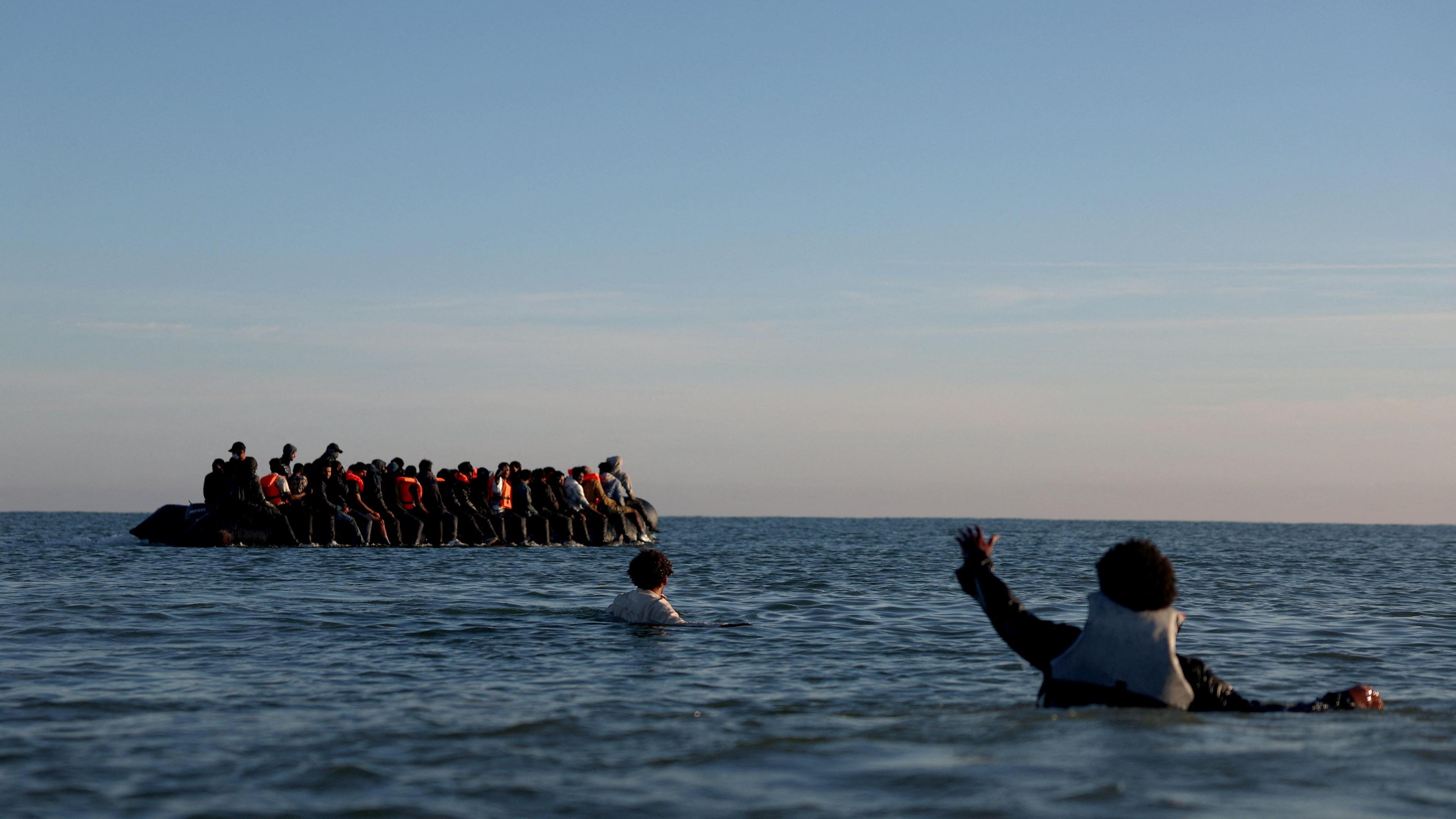Refugees to face longer route to UK settlement rights

- Published
Refugees will have to wait longer than the current five years before they can apply to settle permanently in the UK, under changes the government has said it is planning to the asylum system.
It has also confirmed that the route enabling refugees to automatically bring close relatives to the UK - which was temporarily suspended in September - will be permanently scrapped.
Sir Keir Starmer said the changes will mean "there will be no golden ticket to settling in the UK, people will have to earn it."
It comes as the prime minister meets leaders at the European Political Community summit in Copenhagen, where he will be discussing ways to tackle illegal migration.
Ahead of that meeting, the prime minister said "fundamental changes" were being made to the asylum system to show that "settlement must be earned by contributing to the country".
The changes are similar to those already being planned for people arriving in the UK for other reasons, such as on a work visa, many of whom will have to wait 10 years to settle.
Earlier this week, Home Secretary Shabana Mahmood set out her plans to make it similarly harder for other categories of migrant to qualify for indefinite leave to remain.
Under the proposals, those wishing to apply will have to learn English to a high standard, have a clean criminal record, and volunteer in their community to be granted permanent settlement status.
Details of the new conditions refugees will have to meet in order to settle in the UK and be accompanied by family members will be set out later in the autumn.
A government source said the UK had been "overly generous" towards asylum seekers and wanted to show "we get it, we will reduce the pull factors."
But shadow home secretary Chris Philp called the planned changes a "Starmer gimmick" that "will make no difference whatsoever".
The Refugee Council, a charity, said the government's approach would not deter people trying to get to the UK but would instead push "more desperate people into the arms of smugglers in an effort to reunite with loved ones".
The government has been trying to reduce the numbers of people arriving in the UK on small boats crossing the Channel.
On coming to power in July 2024, Labour promised to "stop the chaos" of the "small boat crisis" but numbers remain at high levels.
UK suspends refugee family reunion applications
- Published1 September
How many people cross the Channel in small boats?
- Published22 October
Currently refugees can apply to settle in the UK - also called indefinite leave to remain - after five years, giving them the right to live, work and study in the country for as long as they want provided they meet certain conditions, external.
Under the forthcoming rules, the government says refugees will be offered a "package of core protection" but will face "a new, longer route to settlement requiring them to contribute, replacing the current five years".
Reform UK has announced it would replace indefinite leave to remain with visas requiring migrants, excluding EU citizens whose rights are protected under Brexit treaties, to reapply every five years.
The Migration Observatory estimates there are about 4.5 million people who hold indefinite leave to remain, including roughly 430,000 non-EU citizens.
The expected changes to settlement rules for refugees will be accompanied by alterations to family reunion conditions.
'Fair but firm'
Migration Minister Mike Tapp said the changes would stop migrants being able to "shop around for asylum".
Tapp told BBC Breakfast that asylum seekers had been "looking for the most generous, almost soft touch" system.
"We're saying we're not a soft touch - we're fair but we're firm," he added.
Asylum applications would still be decided on a "case by case" basis, but scrapping the automatic rights to family reunion and settlement would bring the UK "into line" with the rest of Europe, Tapp argued.
Tapp also said the number of people returned to France under the "one in, one out" deal secured in July has risen to seven. A family of three were the first to arrive in the UK under the scheme last week.
Under the treaty, France agreed to take back migrants who had travelled to the UK by small boat and had their asylum claim withdrawn or declared inadmissible.
For each person returned to France, the UK will accept someone with a case for protection as a refugee who has not attempted to cross the Channel.
Figures from the Home Office show, external 1,899 migrants crossed the Channel since Saturday, pushing the total number of recorded crossings since 2025 past 34,000.
During Thursday's summit in Copenhagen, Sir Keir will meet Danish Prime Minister Mette Fredriksen.
The two leaders are expected to announce £3m to encourage people from Western Balkan countries to stay in the region rather than migrate.
The UK government is also contributing up to £5.75m - up from £4m this time last year - to Italy's Rome Process, a scheme aimed at reducing the number of migrants crossing from Africa to Europe.
The government has said the prime minister will also discuss "how to go further" on changing the European Convention on Human Rights.
On Wednesday, Sir Keir told the BBC he did not want to "tear down" human rights laws but was ready to look again at article three of the European Convention on Human Rights, which protects against torture and degrading treatment.
Sir Keir's comments come after a Labour Party conference dominated by efforts to confront Reform UK, which has been leading opinion polls in recent months.
The Conservative Party's conference in Manchester is due to start on Sunday.